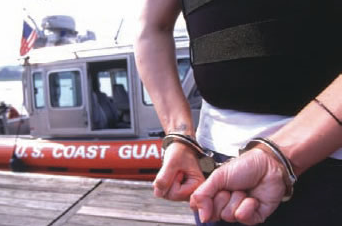By Vincent Pica
District Commodore, First District, Southern Region (D1SR)
United States Coast Guard Auxiliary
Drunk driving, whether that be in a car or in a boat, is one place where I actually feel the legal penalties are too lenient. If a person, uninfluenced by booze, drove a car or a boat recklessly and hurt or even killed someone, they would get a more severe sentencing in many jurisdictions than doing the same thing while drunk, “under the influence” as the legal saying goes. In past ages, drinking and still being able to drive, whether that be a car or boat, might have been considered a badge of honor in certain circles. Today, thank goodness, it is considered reckless lunacy. And things are worse on the water than on land. This column is about that.
Oh, That Swaying Feeling
Often times, when I come in from a boat ride with the family, some of the more lubberly members of the family say, “I can still feel the swaying!” If they happen to jump in the shower, it really gets intensified and they joke that they had to hold on to the shower wall to keep from tipping over! This is clear evidence of the dramatic impact the marine environment has on the body’s sensory perception system. While boating, we are confronted with conflicting information from the eyes, feet and inner ear. The horizon is constantly moving – up, down and sideways – as the boat moves beneath our feet. Our conscious brain has no problem with intellectualizing this. But the unconscious part of our brain is getting sensory overload. This can result in reactions ranging from slight queasiness to absolutely debilitating nausea.
The marine environment is full of “stressors” – the sun, glare and vibration, to name a few, are all pretty common. Stressors intensify the effects of alcohol, drugs and some medications. They can cause fatigue, reduced coordination, weak judgment and slow reaction time. And forget about the vision of the St. Bernard saving you from the cold by giving you brandy. Alcohol makes the body more susceptible to the effects of cold water, not less.
Not surprisingly, all of this adds to boating accidents. U.S. Coast Guard data shows that, in boating deaths involving driving under the influence, more than half the victims capsized their boats and/or fell overboard. Over one in five boating deaths are linked to the use of alcohol.
The Law
 Every state in the Union prohibits the operation of a boat while under the influence of alcohol. The Coast Guard, as a federal entity, enforces a federal law that prohibits Boating Under the Influence (BUI). This law pertains to every vessel, foreign or domestic, operating in U.S. waters, as well as U.S. vessels on the high seas. Penalties may include fines, jail, impoundment of boats, and in some states the loss of boating and/or driving privileges.
Every state in the Union prohibits the operation of a boat while under the influence of alcohol. The Coast Guard, as a federal entity, enforces a federal law that prohibits Boating Under the Influence (BUI). This law pertains to every vessel, foreign or domestic, operating in U.S. waters, as well as U.S. vessels on the high seas. Penalties may include fines, jail, impoundment of boats, and in some states the loss of boating and/or driving privileges.
Essential Boat Operating Skills Adversely Affected by Alcohol or Drug Use
• Peripheral vision
• Night vision
• Inhibitions
• Ability to distinguish colors
• Cognitive abilities
• Judgment
• Balance
• Coordination
• Reaction time
Real Risks. Real Consequences.
Boating under the influence of alcohol or drugs could cost you:
• Someone else’s life
• Your own life
• Your driver’s license
• The time, expense and shame of an arrest
• A fine
• Boat repairs from an accident
• Property damage from an accident
• Medical treatment
In 2008, Operation Dry Water was started by the U.S. Coast Guard, the National Association of State Boating Law Administrators and partner agencies. It is a national weekend of BUI detection and enforcement aimed at reducing the number of alcohol-related accidents and fatalities, and fostering a stronger and more visible deterrent to alcohol use on the water. This year’s program was held the weekend of June 27-29. Zero tolerance is of course the posture, then and now. Booze kills.
If you are interested in being part of USCG Forces, email me at JoinUSCGAux@aol.com or go direct to the D1SR Human Resources department, who are in charge of new members matters, at FSO-PS@emcg.us and we will help you “get in this thing.”
Captain Ed Cubanski is the Captain of the Port and Sector Commander for US Coast Guard Sector Long Island Sound. Captain Cubanski is responsible for all active-duty, reservist and auxiliary Coast Guard personnel within the Sector. Vin Pica, a Commodore for the First District Southern Region in the US Coast Guard Auxiliary, works closely with Captain Cubanski and his staff to promote boating safety in the waters between Connecticut, Long Island and 200 nautical miles offshore. Sector Long Island Sound Command Center can be reached 24 hours a day at 203–468–4401.
Editor’s note: Weekly updates for the waters from Eastport, ME to Shrewsbury, NJ including discrepancies in Aids to Navigation, chart corrections and waterway projects are listed in the USCG Local Notice to Mariners. Log onto navcen.uscg.gov, scroll to “Current Operational/Safety Information,” click on “Local Notice to Mariners” then “LNMs by CG District,” and click on “First District.”



